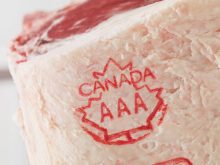For good or ill on July 1 Canada hit back in the U.S. trade war.
The U.S. is now facing $16.6 billion worth of tariffs on many American imports ranging from kitchen appliances and lawn mowers, to ketchup, pickles, Jack Daniel’s whiskey, and toilet paper.
It’s in retaliation to U.S. President Donald Trump’s decision to slap 25 and 10 per cent tariffs on imported Canadian steel and aluminum, respectively.
Will it trigger a tit-for-tat response from the United States and an all-out trade war?
Read Also

Trade uncertainty is back on the Canadian national menu
Even if CUSMA-compliant goods remain exempt from Trump’s new tariffs for now, trade risk for farmers has not disappeared, Sylvain Charlebois warns.
The Trump administration’s response July 2 was much the same as Canada’s earlier: tariffs on U.S. products won’t help Canada.
“We’ve been very nice to Canada for many years, and they’ve taken advantage of that — particularly advantage of our farmers,” White House spokeswoman Sarah Sanders said. “The president is working to fix the broken system, and he’s going to continue pushing for that.”
The Canadian government says the U.S. tariffs are illegal and has launched legal action through the World Trade Organization (WTO) and under the North American Free Trade Agreement (NAFTA).
- Read more: Trump says ‘getting there’ in NAFTA talks
The U.S. says the tariffs are legal under Section 232 of the Trade Expansion Act of 1962, which allows the president to restrict imports seen as threatening national security.
Canada and the U.S. are longtime allies and trade partners. Suggesting Canadian steel and aluminum threaten U.S. security “is absurd,” Foreign Minister Chrystia Freeland says.
“We will not escalate and we will not back down,” Freeland told reporters in Hamilton June 29, while announcing an aid package for affected industries and workers worth up to $2 billion.
Trump has threatened to impose a 25 per cent tariff on Canadian automobiles — a move many economists predict would plunge the Canadian economy into recession.
Economists say it would be odd, given how integrated automobile manufacturing is in North America.
General Motors warned June 29 that another wave of tariffs being considered by Trump could force the company to scale back its business and cost American jobs, the New York Times said.
It’s unclear whether Trump’s tariffs are intended to put pressure on the stalled NAFTA renegotiations, or as the Globe and Mail mused, the first steps in dismantling the U.S.-built, rules-based, international trading order.
Either way, farmers on both sides of the border still support trade, Canadian Federation of Agriculture (CFA) president Ron Bonnett said in an interview June 28.
“I don’t think we have any choice but to respond (to the U.S. tariffs) because otherwise we would just start rolling over on everything,” he said.
“This is a lot broader than just Canada. There have been attacks on the World Trade Organization, as well the relationship with Europe is not good.”
Last month CFA and U.S. National Farmers Union issued a joint statement urging Canadian and U.S. officials “to preserve the strong, long-standing trade relationship between the two countries.”
Trump has repeatedly attacked Canada’s supply management dairy system for restricting American dairy exports to Canada, but while speaking in Fargo, N.D., June 27 he charged Canada discriminates against American wheat by grading it feed.
It’s true, but the Canadian Grain Commission says there’s nothing preventing American farmers from selling their wheat to Canadian grain companies based on its intrinsic quality.
Trump’s rhetoric on Canada’s dairy policy is also one sided, Bonnett said.
“I don’t know how many times he has mentioned the 275 per cent tariff on dairy products,” Bonnett said. “They don’t mention that 10 per cent of the Canadian market is open to the U.S. dairy products with no duty at all… and they (U.S.) only allow three per cent into their market.
“The best business to be in right now is the late-night talk shows because they get new material (thanks to Trump) every day.”
















